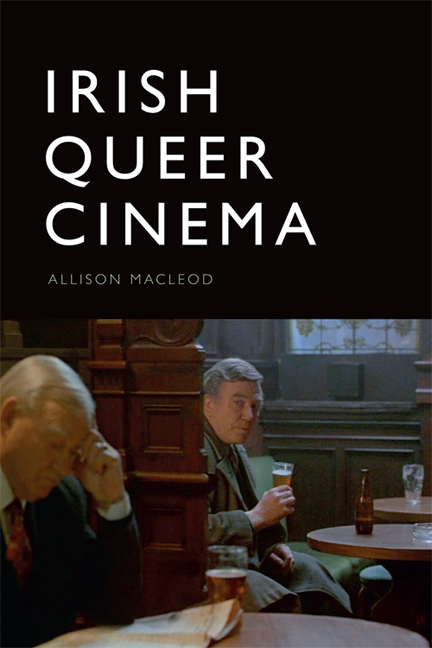Book contents
- Frontmatter
- Contents
- List of Figures
- Acknowledgements
- 1 Queerly National and Nationally Queer: Paradoxes of an Irish Queer Cinema
- 2 Mapping Ireland’s Queer Films
- 3 Re-imagined Kinship and Failed Communities
- 4 The Contested Space of the Irish Pub
- 5 Compartmentalised Cosmopolitans and Rigid Fluidity
- 6 The Queerly Productive Constraints of Rural Space
- 7 Queer Mobilities and Disassociated Masculinities
- 8 Contested Belongings within Diasporic Space
- 9 The Irish Queer Short Film
- 10 Concluding Remarks
- Select Filmography
- Bibliography
- Index
1 - Queerly National and Nationally Queer: Paradoxes of an Irish Queer Cinema
Published online by Cambridge University Press: 04 May 2021
- Frontmatter
- Contents
- List of Figures
- Acknowledgements
- 1 Queerly National and Nationally Queer: Paradoxes of an Irish Queer Cinema
- 2 Mapping Ireland’s Queer Films
- 3 Re-imagined Kinship and Failed Communities
- 4 The Contested Space of the Irish Pub
- 5 Compartmentalised Cosmopolitans and Rigid Fluidity
- 6 The Queerly Productive Constraints of Rural Space
- 7 Queer Mobilities and Disassociated Masculinities
- 8 Contested Belongings within Diasporic Space
- 9 The Irish Queer Short Film
- 10 Concluding Remarks
- Select Filmography
- Bibliography
- Index
Summary
On 22 May 2015, Irish citizens voted in favour of legalising same-sex marriage. This referendum was the first time that a federal government had left the legal question of same-sex marriage to be decided by popular vote. Through the overwhelming yes vote, Irish citizens presented a more liberal and inclusive Ireland to the world that broke away from its historical image as a conservative nation. As well, the international campaign for Irish people living around the world to return to Ireland to vote in the referendum (documented on Twitter through the hashtag #hometovote) was evidence of how Ireland's imagined national community extends beyond the nation-state's geographical borders to become a global community.
In an article in The Irish Times, journalist Fintan O’Toole framed the referendum as more than a victory for ‘Liberal Ireland over Conservative Ireland’; instead, ‘it's the end of that whole, sterile, useless, unproductive division. There is no longer a Liberal Ireland and a Conservative Ireland. The cleavage between rural and urban, tradition and modernity that has shaped so many of the debates of the last four decades has been repaired. This is a truly national moment’ (O’Toole 2015). O’Toole's comment reveals the extent to which Irish identity has historically been defined through oppositions (Irish/British; Nationalist/Unionist; Catholic/ Protestant) as well as underlines the potential for a new form of national imagining to emerge through the break-down of such divisions.
Irish Queer Cinema is located within this context of an Ireland in a state of national re-imagining. This book provides an analysis of representations of queer sexualities in contemporary Irish films to examine the complex role played by Irish cinema in the socio-cultural production, marginalisation, normalisation and interrogation of queerness. In recent years images of LGBTQ (lesbian, gay, bisexual, trans, queer) identities have become increasingly visible in Irish cinema. This growing queer cultural visibility has been linked to global factors, such as Ireland's integration into a European community, global campaigns for gay political rights and social inclusion, and the normalising sexual politics of neoliberalism. It has also been linked to political, socio-economic and cultural developments taking place within Ireland, including the decriminalisation of homosexuality in 1993, shifting demographics and cultural practices in response to Ireland's economic boom and subsequent recession, and the Irish Film Board's (IFB) revised mandate in 1993 of encouraging Irish filmmakers to cater to international audiences and mainstream appeal.
- Type
- Chapter
- Information
- Irish Queer Cinema , pp. 1 - 17Publisher: Edinburgh University PressPrint publication year: 2018



